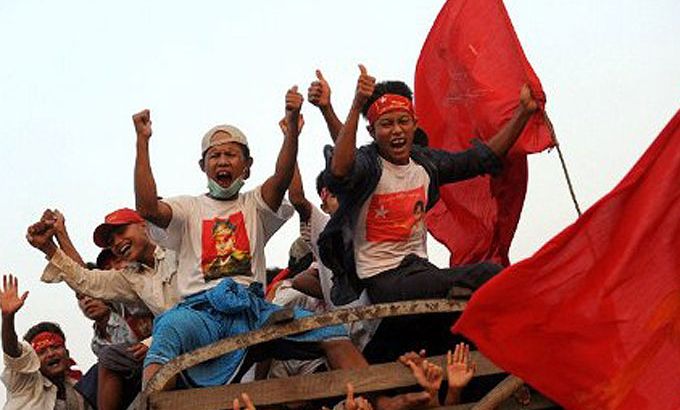US to soften sanctions on Myanmar
Hillary Clinton hails leadership of Myanmar’s president as she says US will ease restrictions and appoint an ambassador.

Hillary Clinton, the US secretary of state, has said Washington will ease restrictions on investment to Myanmar and move quickly to name an ambassador in a further sign of thawing relations between the long-isolated state and Western powers.
Clinton on Wednesday hailed the “leadership and courage” of President Thein Sein after the country held weekend by-elections that will see opposition icon Aung San Suu Kyi entering parliament for the first time.
Hoping to boost reformers in the country, Clinton said the US would also make it easier for Myanmar officials to visit but would not yet ease the bulk of sanctions.
“The United States will stand with the reformers and the democrats both inside the government and in the larger civil society as they work together for that more hopeful future that is the right of every single person,” Clinton told reporters.
Al Jazeera’s Rosalind Jordan, reporting from Washington, described Clinton’s statement as a “confidence-building message”.
“This is an opportunity not just for renewed diplomatic ties, but for US non-governmental organisations to carry out work in civil society building and to protect the environment. Also for [US] businesses to go in and help the people of Myanmar develop their agriculture and tourism sectors,” Jordan said.
Caveats remain
Clinton announced “the beginning of the process” of a “targeted easing of our ban on the export of US financial services and investment”.
She said that the step on investment was “part of a broader effort to help accelerate economic modernisation and political reform”.
But she added: “Sanctions and prohibitions will stay in place on individuals and institutions that remain on the wrong side of these historic reform efforts.”
Clinton said the administration would complete formalities “in the coming days” and then formally nominate an ambassador to the senate for confirmation.
Aung Din, a former political prisoner and executive director of the US Campaign for Burma advocacy group, was more critical.
Referring to the counrty by its former name, he said Myanmar’s leaders had won “enormous” rewards even though Suu Kyi’s National League for Democracy would hold a tiny number of seats in the military-dominated parliament.
“Today will be the best day for the Burmese regime, which is still killing innocent civilians in ethnic areas in Burma,” he said.
Clinton said that the US administration would still press for greater progress on key concerns including a release of all remaining political prisoners and an end to any military co-operation with North Korea.
Al Jazeera’s Jordan said Washington was “sending a message of encouragement for the reform-minded, but it has been made clear that the US won’t ignore human rights abuses”.
China weighs in
On Thursday China called for all sanctions on Myanmar to be lifted after applauding last weekend’s elections, which it said would it hoped would be good for the country’s stability.
“The result was broadly affirmed domestically and by the international community,” said Hong Lei, a foreign ministry spokesman, in China’s first official comment on Sunday’s elections.
“China hopes that this by-election will be conducive to pushing Myanmar’s political reconciliation process and Myanmar’s stability and development,” Hong told a regular news briefing.
While sanctions have blocked Western investments, China has become Myanmar’s biggest ally, investing in infrastructure, hydropower dams and twin oil-and-gas pipelines to help feed southern China’s growing energy needs.
“China has noted that some Western countries have said they will lift sanctions on Myanmar. China has had a consistent stance on this issue. We welcome moves by these countries to lift sanctions on Myanmar and call on all parties to fully lift sanctions on Myanmar as soon as possible,” Hong said.
Beijing has long been Myanmar’s closest partner, but relations have been strained since the country suspended building a Chinese-funded dam in September. Washington’s moves to re-engage with the once-isolated country are likely to complicate ties further.
The European Union may also lift some sanctions, but will maintain pressure for the release of remaining political prisoners, William Hague, the British foreign secretary, said.